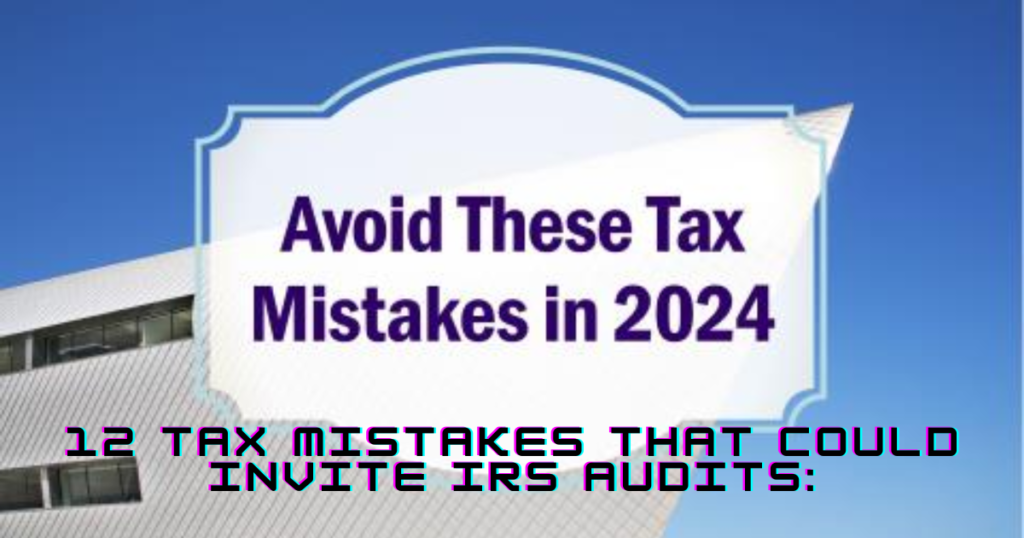Introduction:
As tax season approaches, it’s crucial to turn our attention to the impending task of filing taxes. However, navigating through this process requires a keen awareness of potential pitfalls that might attract the scrutiny of the IRS. This article aims to elucidate 12 prevalent tax mistakes that, if neglected, could trigger IRS audit.

12 Tax Mistakes That Could Invite IRS Audit:
1. Incomplete Returns:
Among the top reasons for audits is the submission of incomplete returns. This occurs when necessary forms or documentation are omitted or errors emerge during the filing process. It’s imperative to gather all required forms, such as W-2s and 1099s, and consult a tax professional if uncertainties persist.
2. Math Errors: IRS Audit
Even seemingly trivial math errors can be audit triggers. Ensuring accurate calculations and updating tax software to the latest version is pivotal in averting such oversights.
3. Excessive Deductions:
The overzealous claiming of deductions can raise suspicions. Only assert deductions supported by legitimate documentation, such as receipts and invoices, to validate the expenses incurred.
4. Underreporting Income:
Overlooking certain income sources, like side jobs or freelance work, is a common mistake. Consulting a tax professional can provide clarity on what constitutes reportable income.
5. Persistent Business Losses:
Consistently reporting business losses may prompt the IRS to question the legitimacy of your enterprise. Maintaining meticulous records of business activities and expenses is crucial to substantiate claims.
6. Inflated Charitable Deductions:
While charitable donations are deductible, excessive claims might attract attention. Ensuring proper documentation, including receipts and canceled checks, is essential to support your deductions.
7. Non-Disclosure of Foreign Assets:
Failing to report foreign assets, encompassing bank accounts and investments, can result in significant fines. Compliance is key, and all foreign assets must be accurately disclosed on your tax return.
8. Excessive Business Expenses:
Claiming an abundance of business expenses without proper justification could lead to scrutiny. Maintain precise records, including receipts, to substantiate the necessity and relevance of claimed expenses.
9. Unreported Cryptocurrency Transactions:
With increased IRS focus on cryptocurrency taxation, failure to report transactions accurately can have consequences. Detailed records and accurate reporting are imperative for those involved in cryptocurrency dealings.
10. Omitted Rental Income: IRS Audit
Neglecting to report rental income may trigger an audit. Thorough documentation of rental income and expenses is vital to ensuring accurate reporting.
11. Overlooked Gambling Winnings:
Failing to report winnings from gambling activities can lead to audits. Maintaining detailed records of both winnings and losses is crucial for accurate reporting.
12. Unreported Alimony Payments:
For those involved in alimony transactions, failure to report such payments may result in audits. Detailed records of alimony transactions are essential for accurate tax reporting.
Conclusion: IRS Audit
Avoiding these common tax pitfalls is paramount in minimizing the risk of an IRS audit. Emphasize meticulous calculations, thorough income reporting, and only assert deductions with proper documentation. Maintaining detailed records of transactions, expenses, and payments is crucial for accurate and trouble-free tax reporting.

People Also Ask:
What will trigger an IRS audit?
The IRS may be triggered to audit individuals for various reasons, including incomplete returns, math errors, excessive deductions, unreported income, consistent business losses, large charitable donations, undisclosed foreign assets, substantial business expenses, unreported cryptocurrency transactions, overlooked rental income, unreported gambling winnings, and failure to report alimony payments.
Who is most likely to be audited by the IRS?
While there is no specific profile, individuals with higher incomes, complex financial transactions, and those claiming unusual or excessive deductions are more likely to be audited. However, the IRS employs a combination of random selection and targeted criteria to identify potential audit candidates.
What actions can reduce the chances of an IRS audit?
To minimize the risk of an IRS audit, individuals should ensure complete and accurate tax returns, report all income sources, avoid excessive deductions, maintain proper documentation for all claims, and stay informed about tax laws and regulations. Seeking professional advice and using updated tax software can also contribute to reducing audit risks.
What not to say in an IRS audit?
During an IRS audit, it’s essential to be cautious about what you say. Avoid making statements that could be interpreted as admissions of guilt or that may raise suspicions. It’s advisable to provide concise, factual answers to the auditor’s questions and refrain from volunteering unnecessary information. Consulting with a tax professional before the audit can also be beneficial in navigating the process.
Disclaimer
This article has been created on the basis of internal data, information available publicly, and other reliable sources to be believed. The article may also include information which are the personal views/opinions of the authors. The information included in this article is for general, educational, and awareness purposes only and is not a full disclosure of every material fact.
All the information on this website i.e. World Virtual CFO – is published in good faith and for general information purposes only. World Virtual CFO does not make any warranties about the completeness, reliability, and accuracy of this information. These are my views for only information purposes. Any action you take upon the information you find on this website (World Virtual CFO), is strictly at your own risk. World Virtual CFO will not be liable for any losses and/or damages in connection with using our website. For details please refer to our disclaimer page.
Dr. Dinesh Sharma is an award-winning CFO and AI strategist with over two decades of experience in financial leadership, digital transformation, and business optimization. As the founder of multiple niche platforms—including WorldVirtualCFO.com—he empowers professionals and organizations with strategic insights, system structuring, and innovative tools for sustainable growth. His blogs and e-books blend precision with vision, making complex financial and technological concepts accessible and actionable.
Comments are closed.